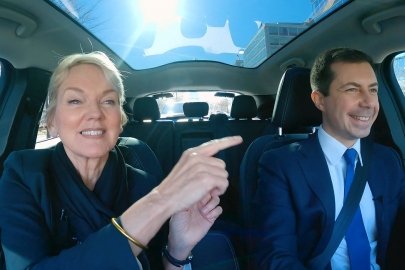Last week, Energy Secretary Jennifer M. Granholm and Transportation Secretary Pete Buttigieg hit the road in an electric vehicle (EV) and drove to Takoma Park, Maryland. With cameras rolling, the two Cabinet members provided a glimpse into their trip.
December 20, 2021Last week, Energy Secretary Jennifer M. Granholm and Transportation Secretary Pete Buttigieg hit the road in an electric vehicle (EV) and drove to Takoma Park, Maryland. With cameras rolling, the two Cabinet members provided a glimpse into what fun a short road trip can be.
But instead of driving to a coffee shop for a caffeine recharge, they pulled into an EV charging station for a battery recharge and a momentous announcement: A new Joint Office of Energy and Transportation that will play a key role in the deployment of 500,000 EV charging stations across the United States.
The electrification of American transportation is underway to tackle the climate crisis and decarbonize the largest greenhouse gas emitting sector in the U.S. There are currently more than two million EVs on the road, and that number is expected to continue increasing – specifically as President Biden and our Administration continue driving an electric future forward. The national network of EV charging stations will be strategically placed in remote, rural, and urban areas all around the country, making EV chargers convenient and accessible for all Americans. That means cleaner air for everyone, particularly underserved communities that have long suffered the most from air pollution caused by the transportation sector.
The President’s Bipartisan Infrastructure Law is making the expansion of America’s EV charging infrastructure possible with $7.5 billion to build a national network of chargers along highways and hard-to-reach areas, spurring the creation of good-paying domestic manufacturing jobs. The Joint Office will work with industry leaders, manufacturers and workers to ensure the network is reliable and equitable, while providing technical assistance to help states effectively plan and build EV infrastructure in urban, suburban and rural areas. And, for Americans who don’t own vehicles, the office will support the deployment of zero-emission mass transit, too.
DOE is also working to make the future of transportation affordable by significantly reducing the cost of batteries by 50% by 2030. This step follows DOE’s announced Li-Bridge, a public-private alliance working to create a strong domestic supply chain and workforce for lithium-based batteries, as well as $209 million to further advance EVs, batteries, and connected vehicles.
With the future of transportation now upon us, this partnership between DOE and the Department of Transportation supports President Biden’s executive order to ensure that half of all vehicles sold in the U.S. by 2030 are electric vehicles. The Joint Office of Energy and Transportation is leading the electrification of America’s automotive industry to drive down emissions, deliver chargers across America and accelerate our path to an electric future.
Kelly Speakes-Backman

Kelly Speakes-Backman was the Principal Deputy Assistant Secretary for the Office of Energy Efficiency and Renewable Energy (EERE) at the U.S. Department of Energy from 2021-2022. In her role, Speakes-Backman led and directed the Office of Energy Efficiency and Renewable Energy, focused on creating and sustaining American leadership in the transition to a global clean energy economy. She oversaw the planning and execution of the organization’s $3.2B portfolio of research, development, demonstration, and deployment activities in energy efficiency, renewable energy, and sustainable transportation.
Speakes-Backman most recently served as the first CEO of the Energy Storage Association, the national trade organization for the energy storage industry. She has spent more than 20 years working in energy and environmental issues in the public, NGO and private sectors. In 2019, Speakes-Backman was honored by The Cleanie Awards as Woman of the Year.
Speaking Engagements
Articles by Kelly Speakes-Backman
-
 Read the letter from Kelly Speakes-Backman, Principal Deputy Assistant Secretary for the Office of Energy Efficiency and Renewable Energy, featured in the Water Power Technologies Office’s 2020-2021 Accomplishments Report.
Read the letter from Kelly Speakes-Backman, Principal Deputy Assistant Secretary for the Office of Energy Efficiency and Renewable Energy, featured in the Water Power Technologies Office’s 2020-2021 Accomplishments Report. -
 Last week, Energy Secretary Jennifer M. Granholm and Transportation Secretary Pete Buttigieg hit the road in an electric vehicle (EV) and drove to Takoma Park, Maryland. With cameras rolling, the two Cabinet members provided a glimpse into their trip.
Last week, Energy Secretary Jennifer M. Granholm and Transportation Secretary Pete Buttigieg hit the road in an electric vehicle (EV) and drove to Takoma Park, Maryland. With cameras rolling, the two Cabinet members provided a glimpse into their trip.
More by this author
-
 Former Principal Deputy Assistant Secretary, Office of Energy Efficiency and Renewable Energy
Former Principal Deputy Assistant Secretary, Office of Energy Efficiency and Renewable Energy

